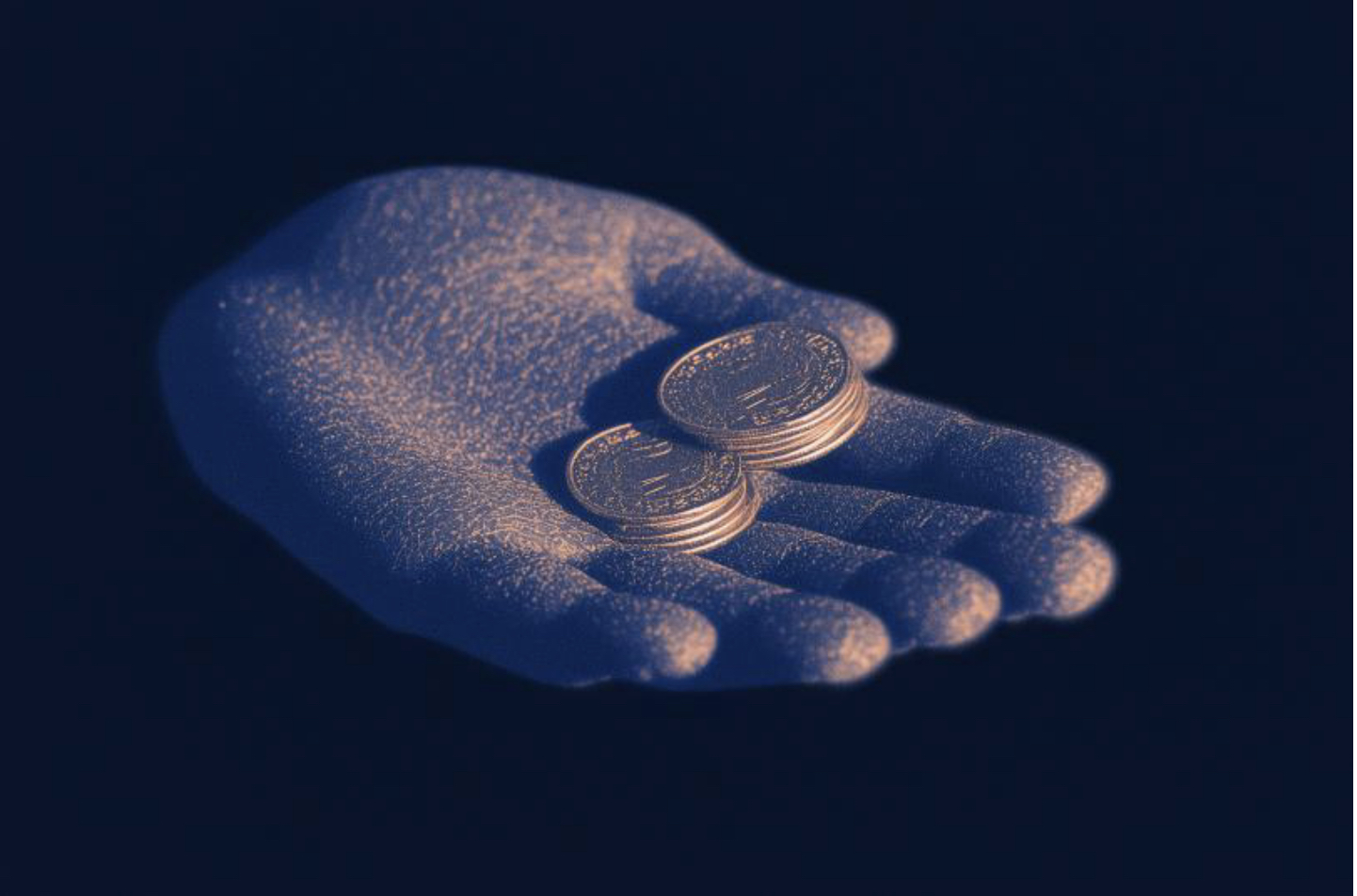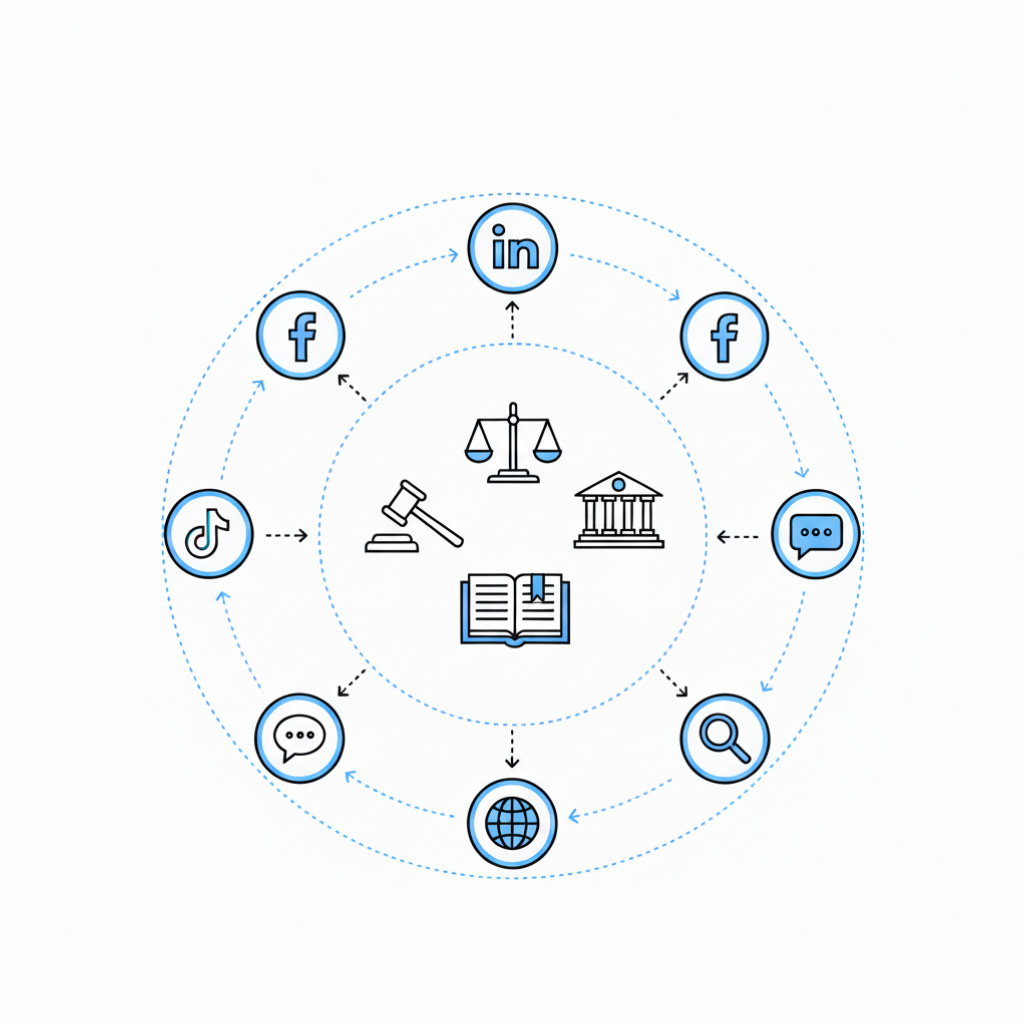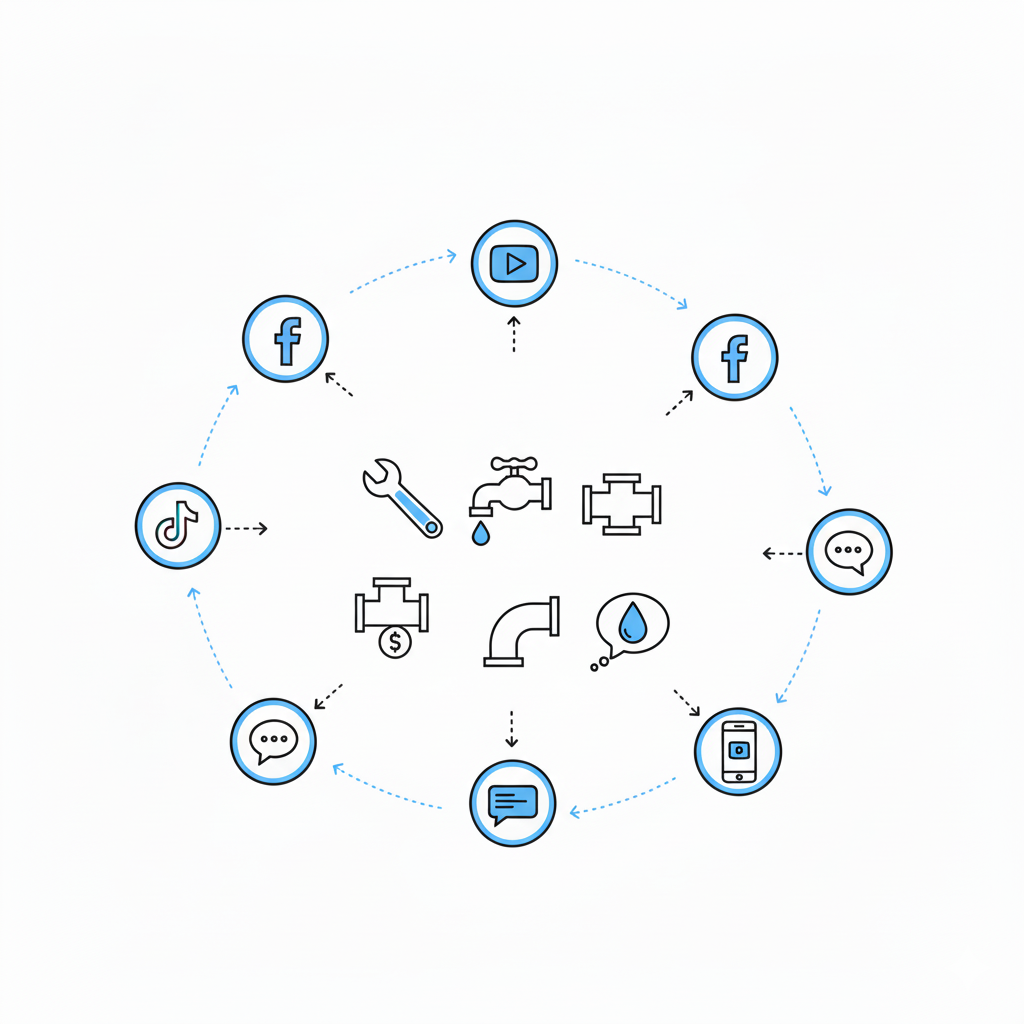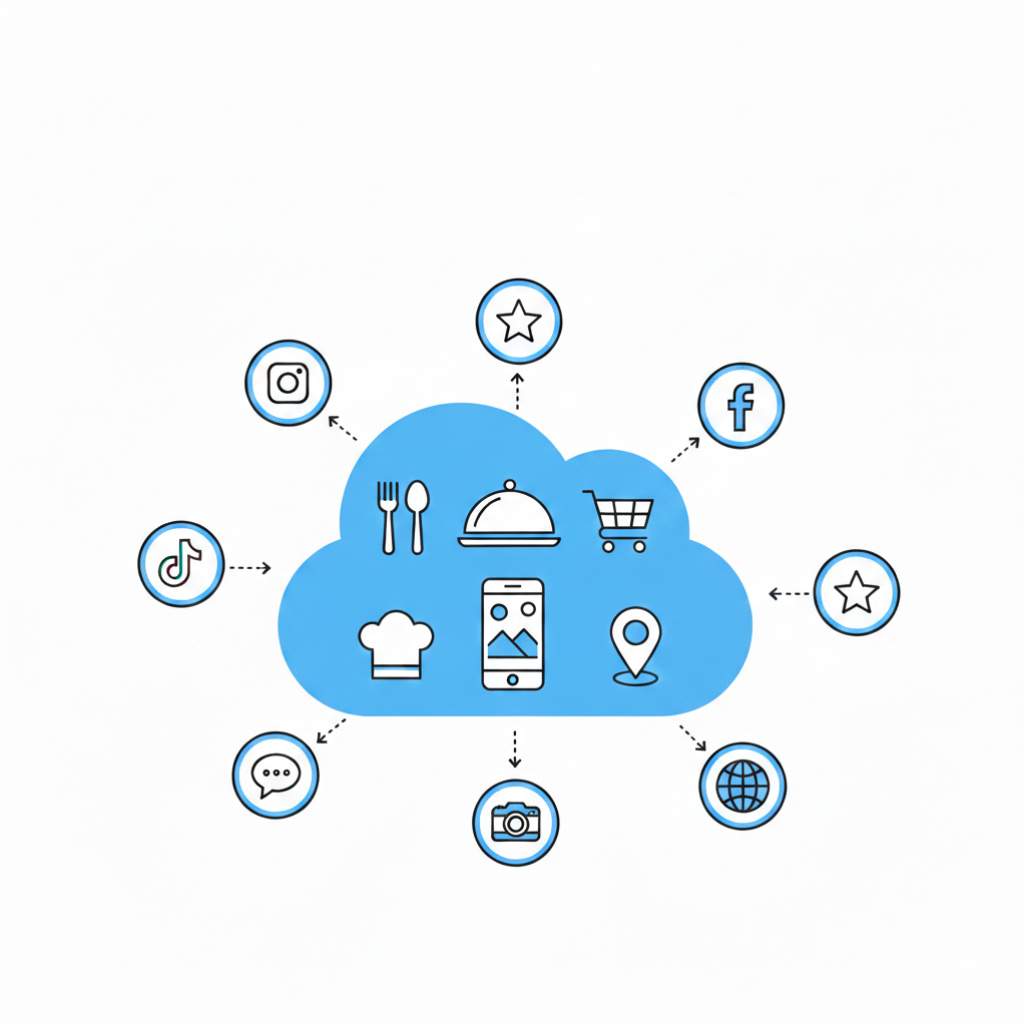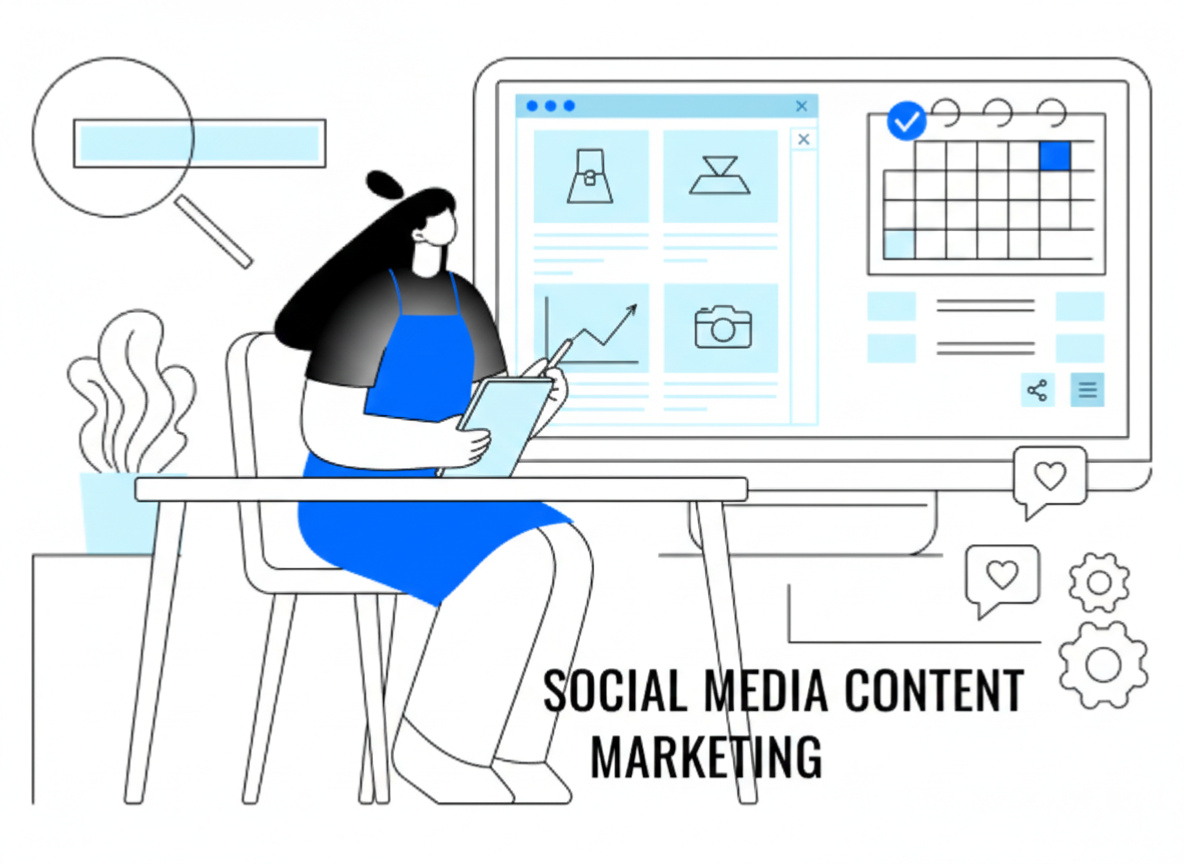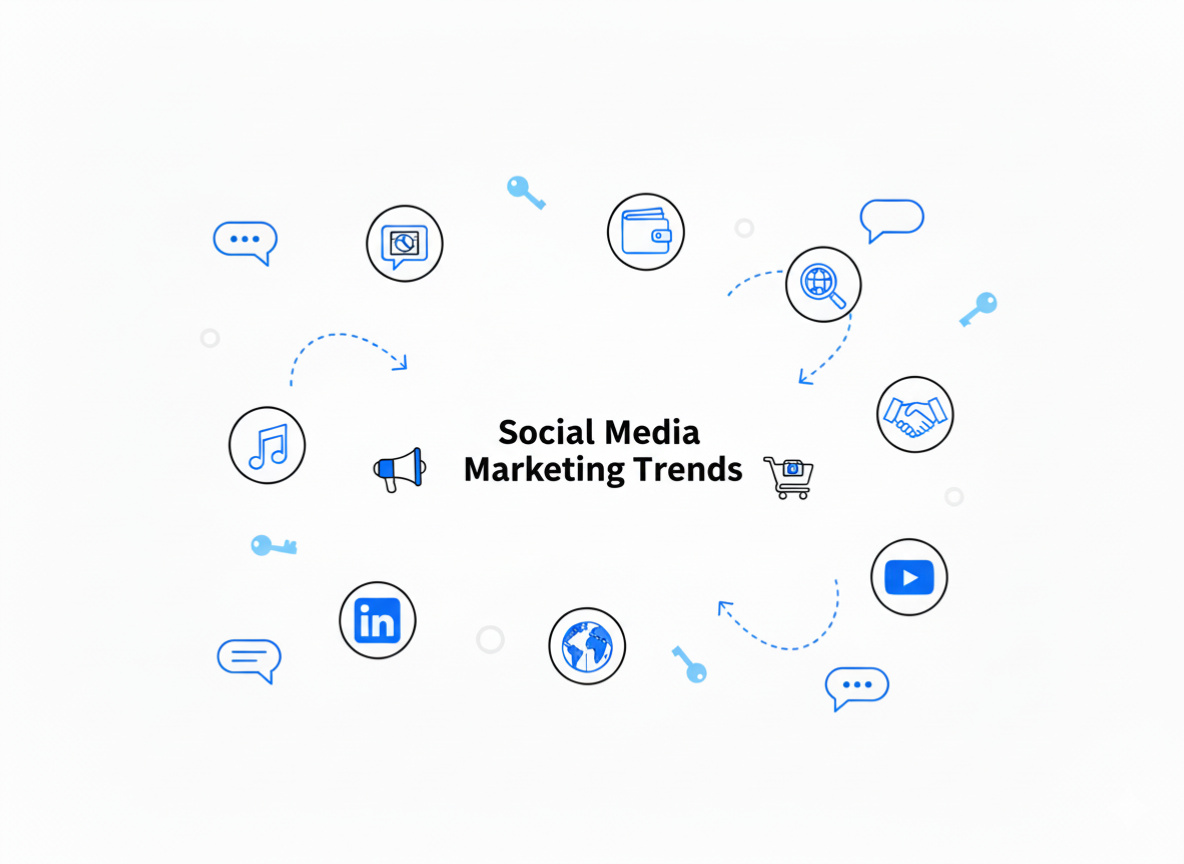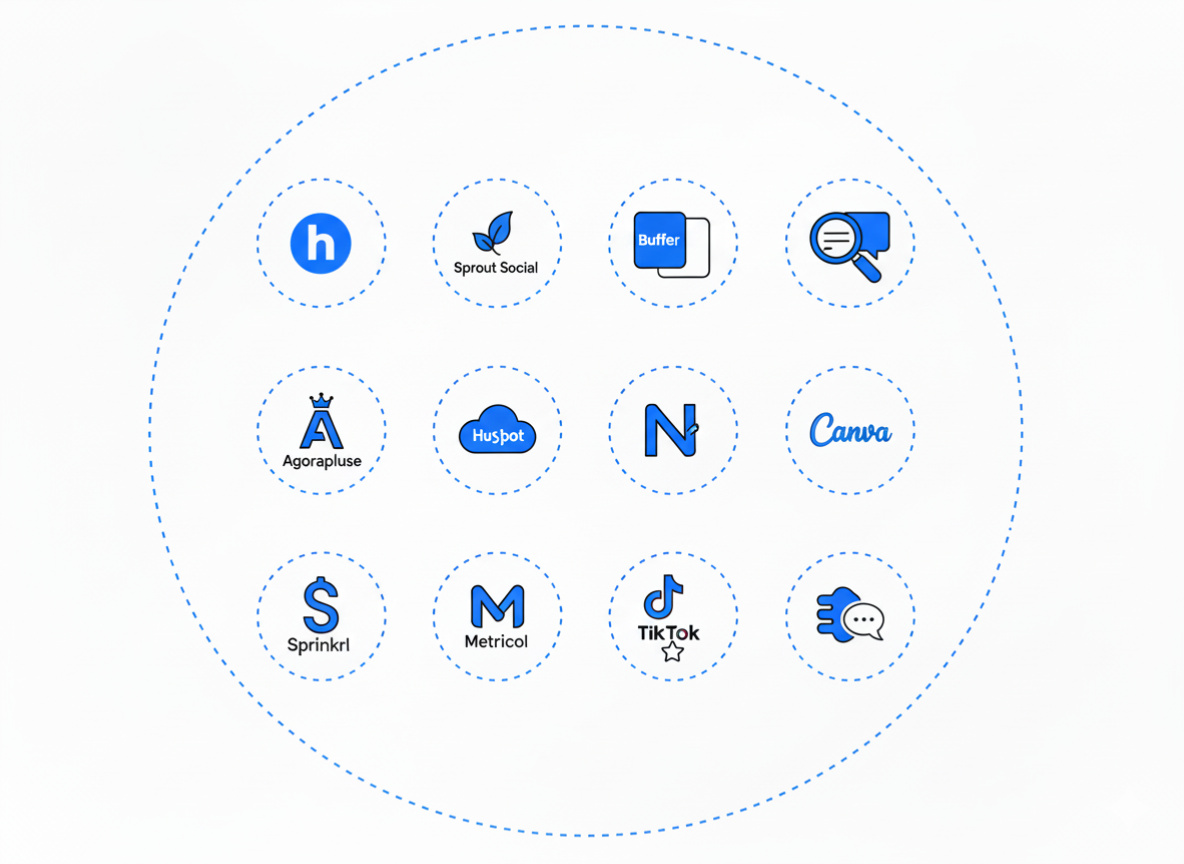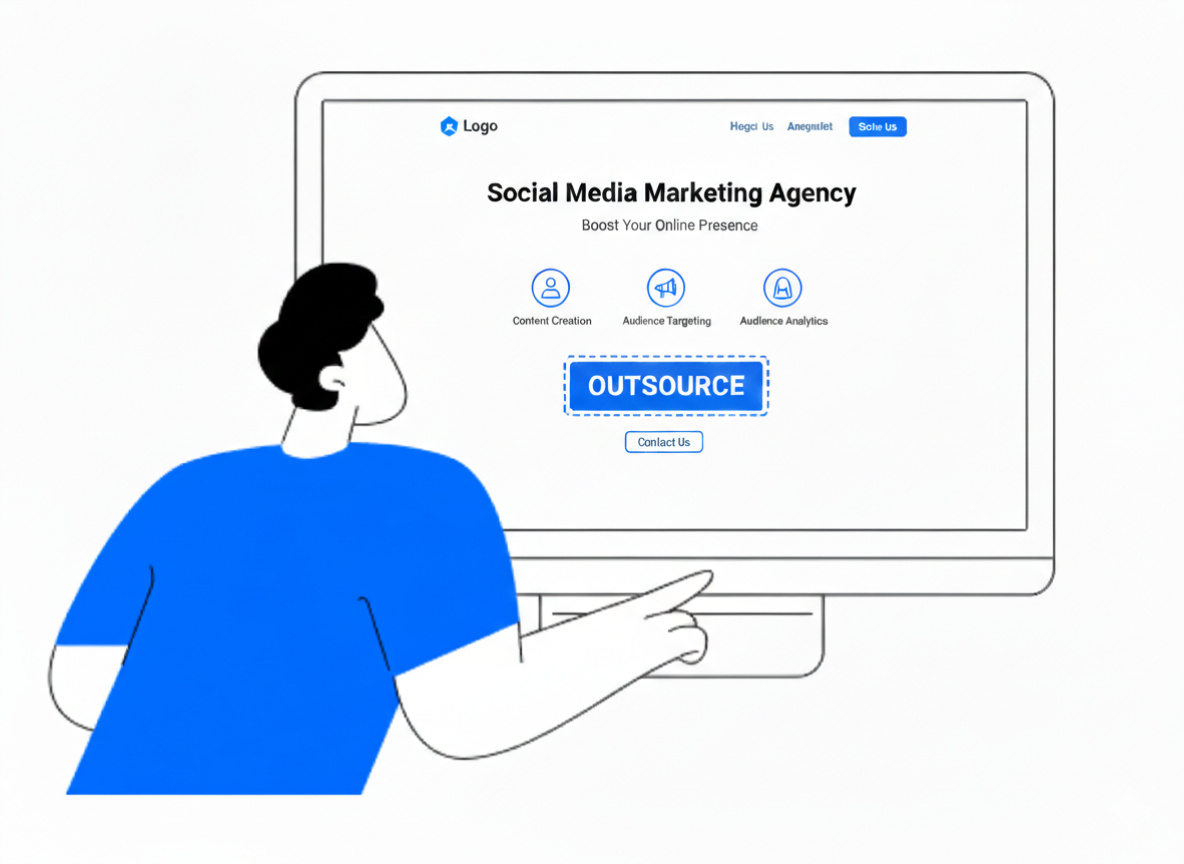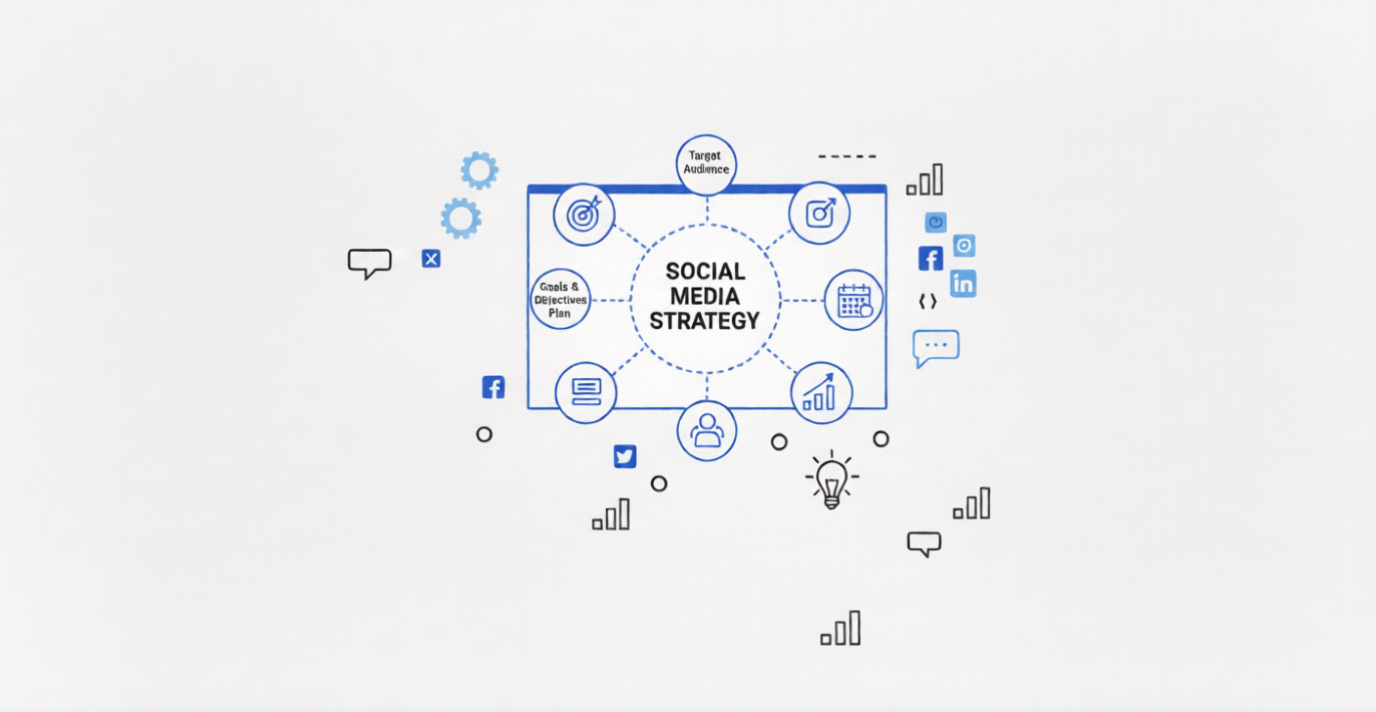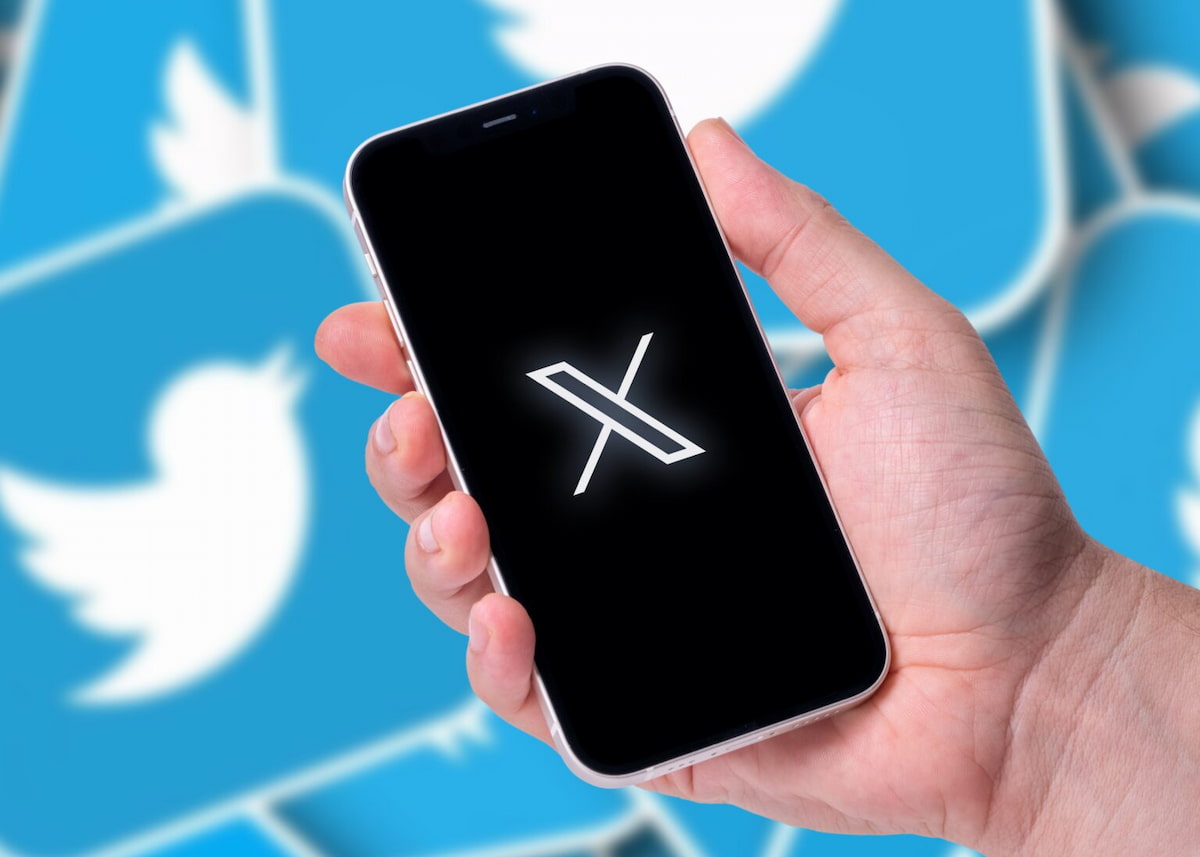Christian Obumseli, a Nigerian-American man who gained national attention after his death in April 2022, is now the subject of renewed public scrutiny due to a series of old tweets resurfacing online. These tweets, posted between 2011 and 2020, show a repeated pattern of remarks that criticize, generalize, and in some cases, demean Black women, while expressing a preference for white women. The posts include statements about appearance, behavior, stereotypes, and race-related jokes.
Christian “Toby” Obumseli: A Tragic Victim of Abuse in a Toxic Relationship
Christian “Toby” Obumseli was described by the Miami Herald in 2022 as a “young Black professional,” a label that accurately captured his identity. With a minimal online presence, he lived largely outside the spotlight until his name became associated with a disturbing and ultimately fatal relationship. Toby was murdered by his girlfriend, social media influencer Courtney Clenney, in what authorities have since described as a violent and toxic relationship.
Courtney Clenney, known online as “Courtney Tailor,” was a 26-year-old Instagram and OnlyFans model at the time of Toby’s death. With over two million followers, she was known for her party lifestyle. Her past included two DWI arrests in Texas—first at 18, then again at 25—reflecting a history of reckless behavior. She now faces a second-degree murder charge and remains in custody.
Toby was 27 years old when he was fatally stabbed in the chest by Clenney on April 3, 2022, inside their Miami luxury apartment. Police arrived after a 911 call and transported him to the hospital, where he died from his injuries. Clenney admitted to the stabbing shortly after, claiming it was an act of self-defense. She said she threw a knife at him, but the timeline and injuries raised doubts.
Earlier that day, Toby had left the apartment and returned with food. Within 12 minutes of his return, an argument erupted, allegedly triggered by jealousy over a brief greeting he gave to a female neighbor. During the confrontation, Courtney’s mother, who was on a call with her daughter at the time, overheard yelling. The stabbing occurred soon after.
Investigations uncovered a long pattern of domestic violence. Courtney had contacted police several times in the final month of Toby’s life to report abuse. However, texts, photos, and videos later recovered from Toby’s iCloud told a different story—one where he was frequently the victim. In 2021, he reported being stabbed in the leg and suffering a head injury. In January 2022, he took a photo of facial cuts requiring stitches, which he said were caused by Courtney. He also shared that she called him racial slurs.
One text read: “Is love going to kill me? February was the worst month I had so far. I got cheated on. I got called that word again. I got slapped in my stitches that has re-opened multiple times and it’s not healing fast enough.”
Toby’s mother, Chio, learned of his death the next day when someone called about his status as an organ donor. Family and friends later said he had become increasingly isolated since entering the relationship with Clenney—a sharp contrast to the caring and dependable person they had known.
The case highlights the broader and often overlooked issue of male victims in abusive relationships. According to the National Coalition Against Domestic Violence, one in four men will experience physical abuse from a partner. However, many do not report it due to societal stigma. Men are often dismissed as abusers themselves, making it difficult for them to seek help or even acknowledge the abuse.
Abuse doesn’t always come in the form of bruises. It can also be emotional, verbal, psychological, and controlling. For men, admitting to being abused can feel emasculating, and societal expectations around masculinity often prevent them from speaking out. Abused men may internalize their trauma, rationalize their partner’s behavior, or suffer in silence.
Although Toby did not leave the relationship, possibly holding onto hope that things would change, his story is now a case study in the hidden damage caused by toxic and abusive relationships. On social media, the couple appeared to live a glamorous life. In reality, their relationship was deeply unstable and dangerous.
Toby’s case shows that abuse can happen to anyone. The signs were there but overlooked. Assumptions about victims can delay help and make the situation worse.
1. Stating a Preference

📅 May 25, 2011
“want a white girl #help”
A brief tweet where Obumseli shares a preference for white women, tagged humorously as a plea.
2. “Loud Black Self” Comment
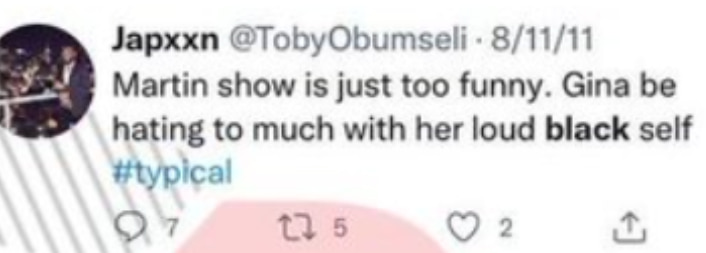
📅 August 11, 2011
“Martin show is just too funny. Gina be hating to much with her loud black self #typical”
Obumseli makes a reference to the sitcom Martin, specifically calling out the character Gina with the phrase “loud black self.” While it appears to be framed as a joke, critics have pointed out that this language reinforces harmful stereotypes about Black women being aggressive or overly loud.
3. Sharing a Stereotypical Tweet
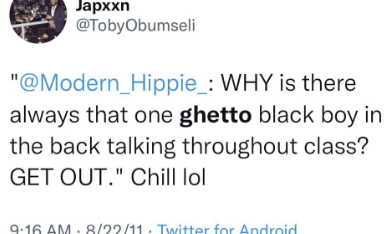
📅 August 29, 2011 – 9:16 AM
“@Modern_Hippie_: WHY is there always that one ghetto black boy in the back talking throughout class? GET OUT.” Chill lol
By retweeting and adding “Chill lol,” Obumseli seemingly supports a stereotypical view of a disruptive Black classmate.
4. Rejecting Black Girls
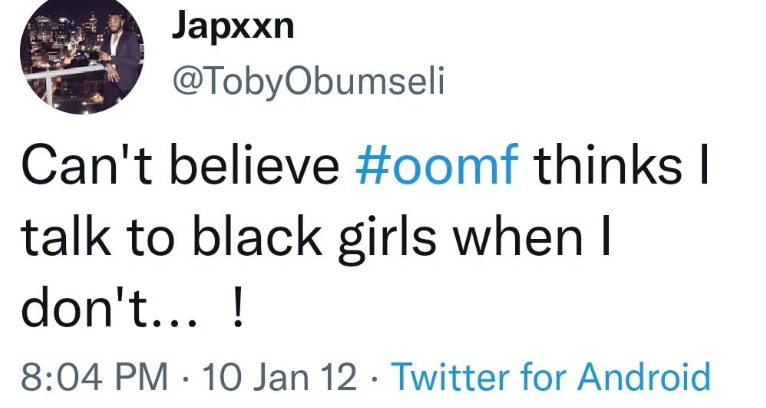
📅 January 10, 2012 – 8:04 PM
“Can’t believe #oomf thinks I talk to black girls when I don’t…!”
This tweet reflects a dismissive and derogatory attitude toward Black girls. It reinforces negative stereotypes and promotes exclusion based on race, which many found offensive and harmful.
5. Stereotype and Dismissal of Black Women
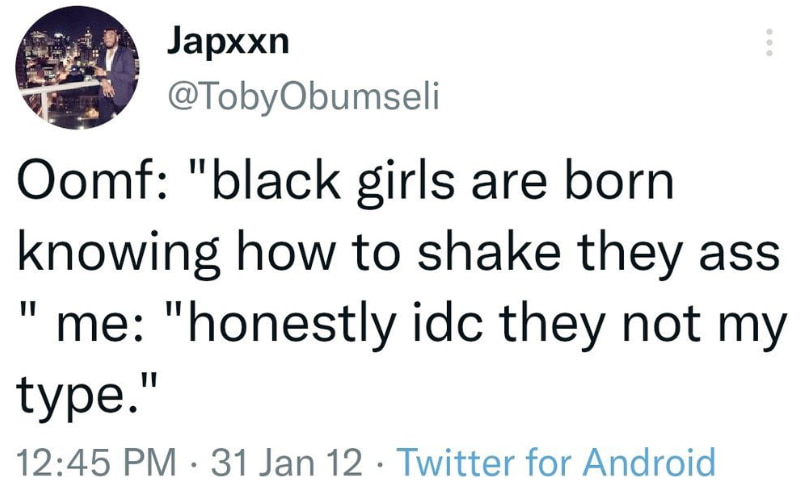
📅 January 31, 2012 – 12:45 PM
“Oomf: ‘black girls are born knowing how to shake they ass’ me: ‘honestly idc they not my type.’”
Obumseli dismisses a racialized stereotype by stating a personal preference against Black women, reinforcing his repeated pattern of distancing from them.
6. Not Just One Group Can Cook

📅 March 13, 2012
“Black girls aren’t the only one’s who can cook in the world!”
This tweet drew attention for its dismissive tone toward Black women. Though likely intended as a general opinion, many later viewed it as unnecessarily divisive and disrespectful.
7. Criticism of Black Girls on TV
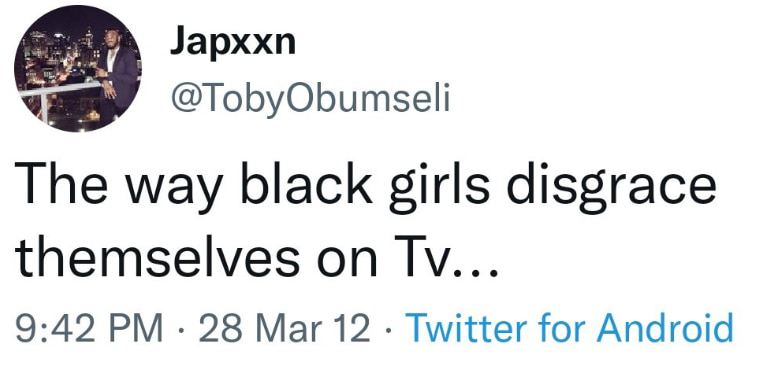
📅 March 28, 2012 – 9:42 PM
“The way black girls disgrace themselves on Tv…”
Obumseli disparages the behavior of Black girls on television, suggesting shame without clarification.
8. Insult Toward Black Women
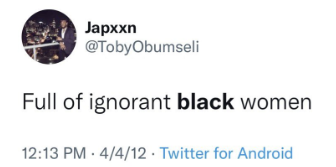
📅 April 4, 2012 – 12:13 PM
“Full of ignorant black women”
A generalizing and offensive remark targeting Black women with no context, reinforcing negative stereotypes.
9. Complaint About Classmates

📅 May 3, 2012 – 12:16 PM
“Once again I’m tired of these black girls in my government class!!”
Obumseli makes a discriminatory remark that unfairly targets Black girls as a group. Instead of addressing individual actions, he generalizes based on race, which is offensive and harmful.
10. Use of the Term “Akata”
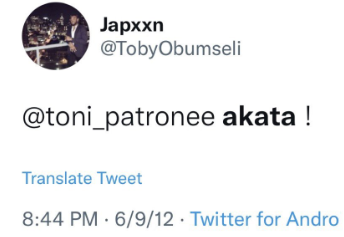
📅 June 9, 2012 – 8:44 PM
“@toni_patronnee akata !”
“Akata” is a controversial term sometimes viewed as derogatory when used to describe African Americans. He uses it without context or explanation.
11. Objectifying White Girls in Shorts

📅 July 31, 2012
“White girls wearing white booty shorts everywhere; now thats what I like!”
He continues to sexualize white women, reducing them to their physical appearance.
12. Thirst of Black People

📅 September 21, 2012
“The thirst of black people in college smh”
In this tweet, he makes a generalizing remark about Black people in college, using the term “thirst” in a derogatory way. The vague insult adds to the pattern of tweets seen by many as dismissive, stereotypical, and racially biased.
13. Commenting on White Girls’ Appearance

📅 February 9, 2012
“When the beautiful white girls #atplanoeast wear yoga/tights >> ^_^”
A tweet objectifying white women based on appearance and school location.
14. Expressing Love for White People

📅 February 22, 2012
“@toni_patronnee: Lol I love white people” sheeeiiit me to girl!! ^_^”
A public affirmation of affection for white people, phrased casually in agreement with someone else.
15. Responding to a Racist Joke Exchange
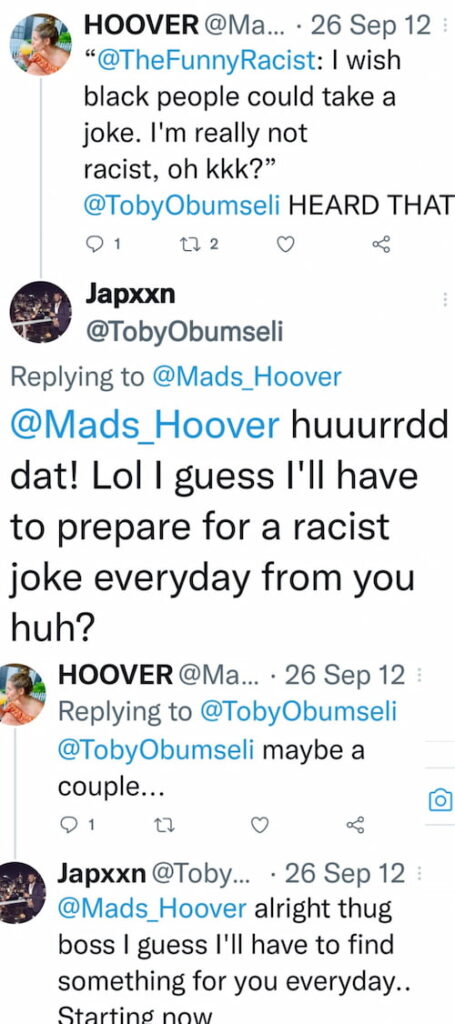
📅 September 26, 2012
@Mads_Hoover (quoting @TheFunnyRacist):
“I wish black people could take a joke. I’m really not racist, oh kkk?”
@TobyObumseli: HEARD THAT
@TobyObumseli:
“@Mads_Hoover huuurrrdd dat! Lol I guess I’ll have to prepare for a racist joke everyday from you huh?”
@Mads_Hoover:
“maybe a couple…”
@TobyObumseli:
“alright thug boss I guess I’ll have to find something for you everyday.. Starting now”
This exchange shows Obumseli reacting to a post that makes light of racist jokes. Rather than rejecting the comment, he continues the conversation in a joking manner. His responses suggest that he did not take issue with the racist remark and instead chose to respond casually.
16. Talking About White Girls and Culture

📅 May 17, 2013
“@stuart_little lol I can teach a white girl a little about the African culture 😉”
Obumseli expresses interest in white women while implying he could teach them about his background, suggesting a fetishized dynamic.
17. Comment About Black Jokes
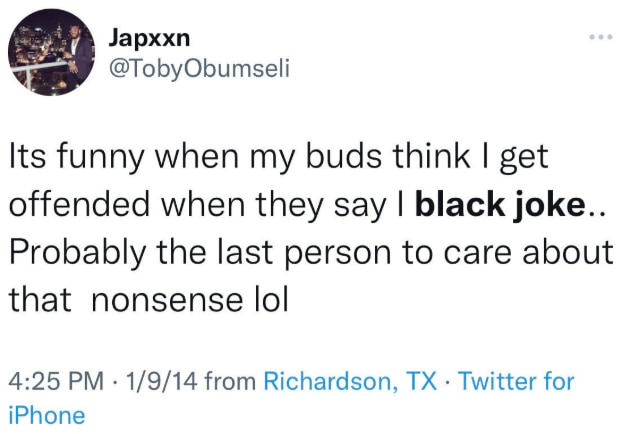
📅 January 9, 2014 – 4:25 PM
“Its funny when my buds think I get offended when they say I black joke.. Probably the last person to care about that nonsense lol”
Obumseli downplays racial jokes, indicating he doesn’t mind them, even when they are offensive.
18. Comparing Women by Race
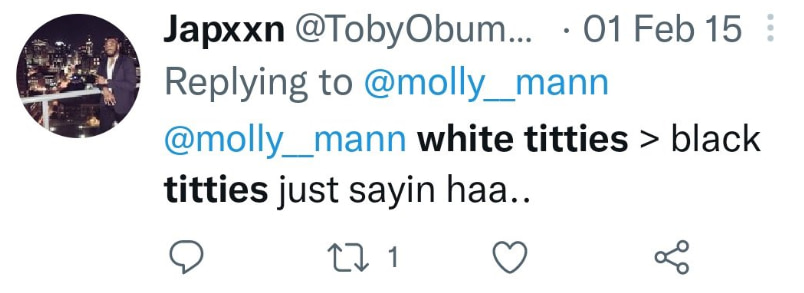
📅 February 1, 2015
“@molly_mann white titties > black titties just sayin haa..”
Obumseli publicly made a racially charged comparison between women’s bodies, prioritizing white women over Black women in a sexualized manner.
19. Criticizing Black Lives Matter Timing
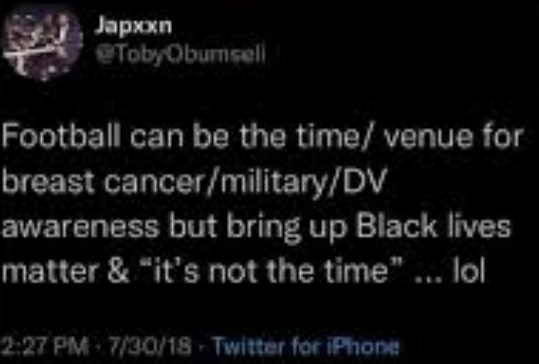
📅 July 30, 2018 – 2:27 PM
“Football can be the time/ venue for breast cancer/military/DV awareness but bring up Black lives matter & ‘it’s not the time’ … lol”
This tweet stands out for a different reason—challenging the hypocrisy of social cause timing, though tone is unclear due to “lol.”
20. Focus on Mental Calmness

Source: https://x.com/TobyObumseli/status/1176695740124581888
📅 September 25, 2019 – 6:11 AM
“Smiling more , breathing more.”
This tweet reads as a peaceful affirmation, but it’s marked with irony considering Obumseli’s violent death in 2022. CBS News later reported on Clenney’s arrest for second-degree murder, uncovering a history of abuse. The phrase might reflect a coping mechanism in the face of unseen personal stress.
21. Emphasizing Mutual Effort in Relationships
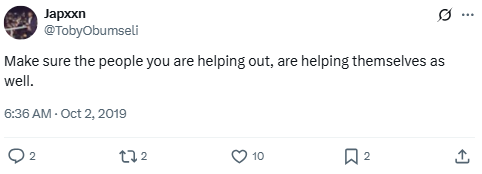
Source: https://x.com/TobyObumseli/status/1179238639173324810
📅 October 2, 2019 – 6:36 AM
“Make sure the people you are helping out, are helping themselves as well.”
This reflects a belief in mutual effort in relationships. After his death, the advice stands in stark contrast to reports of ongoing abuse, including a 2022 elevator altercation and a 2021 Las Vegas charge, raising questions about whether he was applying this wisdom to his own life.
22. Struggles Hidden Behind Positivity

Source: https://x.com/TobyObumseli/status/1163274593571880960
📅 August 19, 2019 – 5:20 AM
“Life has been great, just not showing it”
This post hints at a hidden emotional or mental burden. Later revelations of Clenney’s abusive behavior—including physical attacks and emotional volatility—align with the idea that Obumseli’s outward silence masked inner struggles.
23. Growth and Changing Social Circles

Source: https://x.com/TobyObumseli/status/1151873037177937921
📅 July 18, 2019 – 6:15 PM
“New levels require new friends.”
A motivational statement often tied to personal growth, this message takes a darker tone in retrospect. His relationship with Clenney was seen as a “new” chapter, yet ended fatally. Replies also referenced racial dynamics, critiquing the choice of his partner in the context of prior tweets disparaging Black women.
24. Gratitude for Life Amid Future Tragedy

Source: https://x.com/TobyObumseli/status/1126059969420365824
📅 May 8, 2019 – 12:43 PM
“Thank God for another day not promised. Let’s get it”
This expression of gratitude appears motivational. However, considering his later death at the hands of his partner, it highlights a tragic contrast between hope and outcome. The case reignited discussions on how positive posts may mask deeper issues.
25. Encouraging Family Connection

Source: https://x.com/TobyObumseli/status/1274935563477487618
📅 June 22, 2020 – 8:21 AM
“Reach out to family.”
This post encourages maintaining familial bonds, yet replies to it resurfaced after his death, showing a past rejection of Black women and hints at family-related tension. The irony deepens when considering his isolation from family before his murder.
26. Expressing Purpose and Drive

Source: https://x.com/TobyObumseli/status/1259179744886689799
📅 May 9, 2020 – 8:53 PM
“On a mission.”
The tweet projected ambition and determination. However, in hindsight, it carries tragic undertones. Replies suggested it reflected identity struggles and internalized biases, with some referencing racial stereotypes. These critiques intensified following the details of his abusive relationship.
27. Pride in Independence

Source: https://x.com/TobyObumseli/status/1217288399041769473
📅 January 15, 2020 – 5:32 AM
“Did it on my own.”
A self-empowerment tweet that gained darker relevance after his death. Reports show that Obumseli endured abuse alone, as documented in iCloud messages revealing stabbings and injuries prior to the fatal incident. His independence may have prevented him from seeking help.
28. Participating in a Festival Experience

Source: https://x.com/TobyObumseli/status/1210362420167921665
📅 December 27, 2019 – 2:51 AM
“Lights all night round 5 — full send”
Likely referencing the EDM event “Lights All Night” in Dallas, this post suggests a celebratory mood. Yet its carefree tone contrasts sharply with the turmoil later revealed in his life, adding emotional weight in retrospect.
29. Reflecting on a Year of Effort

Source: https://x.com/TobyObumseli/status/1210290780474150912
📅 December 26, 2019 – 10:06 PM
“I put in that work this year , dear lord.”
This tweet reflects pride and prayer after a productive year. Tragically, less than three years later, Obumseli would be dead. The contrast between his dedication and the violence he faced underscores the unseen personal dangers behind success narratives.
30. Prediction of a Chaotic Year

Source: https://x.com/TobyObumseli/status/1206642576402583552
📅 December 16, 2019 – 8:29 PM
“2020 is about to be crazy.”
This tweet gained retrospective irony as 2020 brought global upheaval, including the COVID-19 pandemic and the murder of George Floyd. Obumseli’s own life would also take a tragic turn—he was killed in April 2022 by his girlfriend, Courtney Clenney. The tweet’s replies later referenced the term “Becky,” pointing to racial and cultural tensions. His post, once lighthearted, now reads as foreshadowing a year of personal and societal crisis.
Reactions from the Black Community
Christian Obumseli’s resurfaced tweets sparked intense backlash online, particularly from Black women, who were the primary targets of many of his offensive remarks. The posts, which repeatedly demeaned and stereotyped Black women while praising white women, were seen as part of a broader pattern of internalized racism and misogynoir. For many, the tweets weren’t just jokes or immature comments from the past; they reflected real and harmful attitudes that contributed to feelings of exclusion and disrespect.
On April 7, 2022, @EmperorTChalla responded to the controversy with a tweet that quickly gained traction:
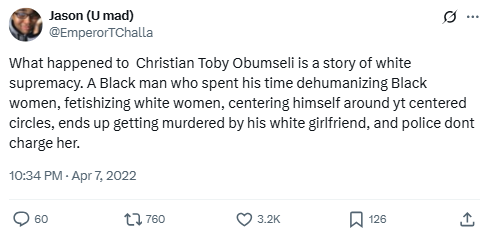
Source: https://x.com/EmperorTChalla/status/1512151907804094464
“What happened to Christian Toby Obumseli is a story of white supremacy. A Black man who spent his time dehumanizing Black women, fetishizing white women, centering himself around yt centered circles, ends up getting murdered by his white girlfriend, and police don’t charge her.”
This comment connected Obumseli’s personal behavior to systemic issues, suggesting that his rejection of Black women and embrace of whiteness played a role in the tragedy that followed.
Later that day, Twitter user @PilarNole_ expressed deep frustration with calls for Black women to defend or mourn Obumseli, writing:
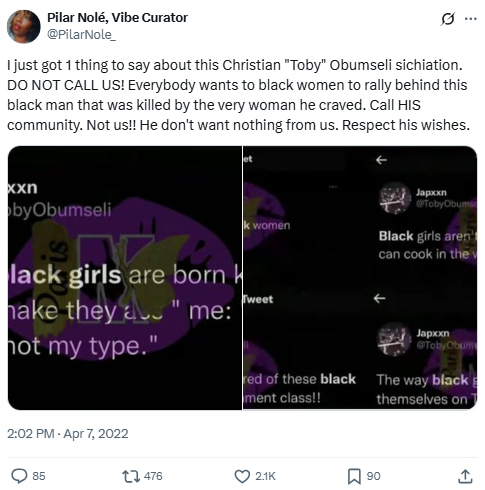
Source: https://x.com/PilarNole_/status/1512023090968018953
“I just got 1 thing to say about this Christian ‘Toby’ Obumseli sichiation. DO NOT CALL US! Everybody wants black women to rally behind this black man that was killed by the very woman he craved. Call HIS community. Not us!! He don’t want nothing from us. Respect his wishes.”
Her tweet reflected a common sentiment among Black women online — that Obumseli had made it clear he did not value them in life, and they should not be expected to support him in death.
That same day, @aye_drey posted another viral reaction:
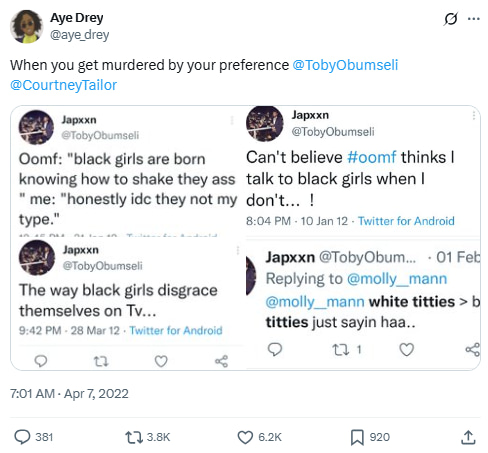
Source: https://x.com/aye_drey/status/1511917074674688009
“When you get murdered by your preference @TobyObumseli @CourtneyTailor.”
Attached to the tweet were screenshots of Obumseli’s old posts, including one where he wrote, “Can’t believe #oomf thinks I talk to black girls when I don’t…” and another comparing “white titties > black titties.” These tweets served as evidence for many that Obumseli had publicly disrespected Black women for years.
The reactions were widespread and emotionally charged, with many arguing that the racism and misogyny in Obumseli’s tweets couldn’t be separated from the conversation surrounding his death.
Conclusion
Christian Obumseli’s resurfaced tweets have become a focal point for discussion about racial attitudes, identity, and online behavior. The consistent pattern in his posts—minimizing or mocking Black women while showing preference for white women—has led to criticism and deeper questions about his views and how they relate to his life and tragic death. These tweets, viewed alongside the details of his abusive relationship and eventual murder, present a complex and uncomfortable picture. Public reaction continues to be divided, with some focusing on the social commentary in his tweets and others emphasizing the circumstances that led to his death. The overall situation reflects how past online behavior can influence public perception, especially when paired with highly visible and tragic events.

